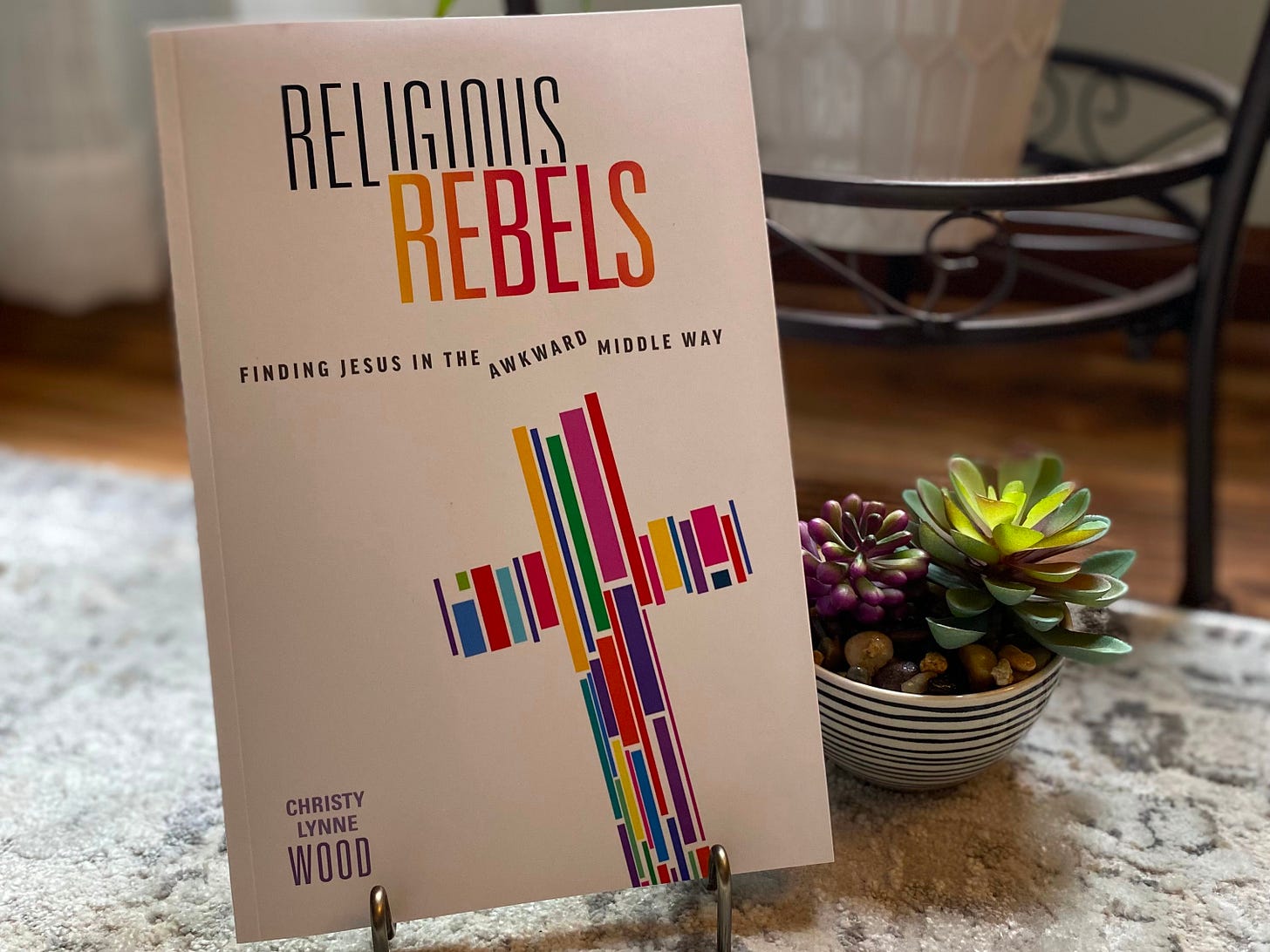Rethinking Faith: Red Flags & Green Lights, Invisible Jesus, and Lectio Divina
This month we will question red flags and green lights relating to Christianity, ponder the book "Invisible Jesus," and explore the practice of Lectio Divina.
Rethinking Faith: February 2025
Welcome to the February issue of Rethinking Faith. This month we will question red flags and green lights regarding people and organizations claiming to be Christian, ponder the new book Invisible Jesus, and explore the monastic practice of Lectio Divina. I’m glad you are here!
What Are Some Red Flags and Green Lights Regarding People and Organizations that Claim to be Christian?
I’ve been leading our young adult ministry at church for the past couple of years. This year we have a very small group. Sometimes I feel discouraged by the size, but mostly I’m encouraged by the depth and closeness we have. The young adults in our group are in their early twenties. They are navigating important life decisions, school, work, friendships, and romantic relationships. They are also digging in and asking some great questions. And they are always up for discussing one of my random topics which I appreciate.
A couple of weeks ago I shared pieces of my story from growing up in Bill Gothard’s IBLP cult, talked about how my parents missed the red flags as college students when they were taken to Gothard’s Basic Seminar, and shared about a local college student who got caught up in a worship ministry connected to the NAR (New Apostolic Reformation) and disappeared for a while. We talked about how not everyone claiming to be a Christian actually is, and we went over some read flags that most high-control religious organizations have in common.
The red flags we came up with included:
Controlling behavior or controlling our behavior.
Us versus them attitudes and the idea that we are the only ones who are right.
Any form of isolation from people who aren’t in the group.
A charismatic or domineering leader who needs the final say in everything.
Extreme emphasis on emotionalism or spirituality.
Leaders who get directions “straight from God” especially if those directions don’t line up with Scripture.
Using Scripture out of context.
The young adults in my group have mostly grown up in the church and in Christian homes. A few of them have come to faith in Jesus on their own in high school or college. It’s fascinating to see the way they think and watch as the Spirit moves and guides them.
One of the girls had recently attended a worship rally at a secular college with a friend. She said the whole time she was there something felt off, but she was trying to convince herself that it was just her own cynical attitude. Together we researched the worship ministry that put on the rally as well as the church who sponsors the worship ministry, and it was quickly obvious to me that they were connected to the New Apostolic Reformation. She felt the emotional manipulation from the stage and was skeptical of some of the signs and wonders that were “performed.” Watching as she recognized that the Holy Spirit had been speaking to her was pretty incredible.
Another one of our guys was texting me for the next few days as he did his own research into the NAR and was shocked by what he discovered. He told me that he’d always been told to be careful of certain ministries and churches such as Bethel Church in Redding, CA, but no one had ever told him why. If you aren’t familiar with the NAR, please read the article below.
At our next meeting, I flipped the script and asked my young adults how they know if something or someone is actually following Jesus and not just empty religion or false ideas about God. I didn’t have a lesson that week, just questions. We talked about the core of Christianity, the differences in denominations and how they can encourage us to learn and grow in our own faith, and the fruit in people’s lives that is evidence of the Spirit of Jesus.
It was an incredibly encouraging conversation!
I asked what beliefs were non-negotiable in order for someone to be a Christian. They only had a few and I loved it.
The existence of God.
The deity of Jesus—that he was God.
Salvation is by faith—there is nothing we can do to earn it.
I asked how they knew if someone was actually a Jesus follower/Christian. Instead of going to a list of beliefs, they went to fruit. Does that person look like Jesus? Do they sound like Jesus? Do they love like Jesus?
“On the other hand, if we follow the guidance of the Spirit, our lives will bear good spiritual fruit. The Spirit will grow in us the fruit of love and joy, peace and patience, kindness and goodness, faithful hearts, gentle ways, and self-control” Galatians 5:22-23 (First Nations Version).
There are too many supposed Christian leaders that do not look or act like Jesus in our world these days. The fruit coming out of their lives in public and especially in secret does not match the fruit of the Spirit. And yet they claim to hold correct theology. Something is off somewhere.
Do they actually know Jesus? Do we? Or do we follow a Jesus we have made in our own image? What is the fruit coming out of our lives? Coming out of the people’s lives we follow as leaders? Do we care?
I care. I want to follow Jesus, be transformed by the Spirit, and be totally consumed with the backwards, inside out, upside down Kingdom that is not of this world.
“We believe deconstruction is a prophetic movement resisting a distorted gospel. It is not a problem; it is a voice. And we need to listen to what it is saying to the church.”
Invisible Jesus, by Scot McKnight and Tommy Preson Phillips
I’ve underlined more of this book than anything I’ve read in a long time. In many ways, I feel like I could have helped to write it. The authors say things that I’ve said and felt for years. I’m currently a little over a third of the way through and am finding it an easy read.
Invisible Jesus acts like it is written to those still in the church who are struggling to understand deconstruction. Maybe they would read it, but I think it would offend many of them and they would put it down before they got more than a couple of chapters into it. Instead it feels like a book written to people who are trying to explain their own deconstruction journey.
It’s beautiful and validating.
One of my favorite parts so far is the constant reminder that most people who deconstruct don’t actually leave the faith. According to a 2022 study by HarperCollins, nearly nine out of ten people who went through deconstruction and an intense renovation of their belief systems continued to believe in Jesus. Maybe they walked away from their church or denomination, but in most cases they walked away to another form of the Christian faith. This matches what I’ve experienced. It also lines up with the people I’ve talked to here on Substack and also on Threads.
“Time and again, we’ve found that deconstructors want to get back to Jesus and want to base everything they believe on Jesus.”
“We have found that the Spirit is present and active around the table with followers of Jesus who seek Christlikeness together and lay down roots in fresh ways as new expressions of Christ’s body in the world. This is the liberation we speak of in this book—freedom to lay down culturally burdened forms of Christianity for a more Jesus-formed, Spirit-shaped faith.”
Invisible Jesus
I’m reading this book and realizing that I want more of Jesus. I want to know more about him in his cultural setting—as a Galilean Jewish person. I want to experience him and his Spirit in my daily life. I want Jesus to lead me to a more whole understanding of God.
I’m guessing that’s what many of you want too.
Better Late than Never to the Lectio Divina Party
I’ve been hearing people talk about Lectio Divina for a few years now. I knew that it was a way to read Scripture and that was about it. On Tuesday during my monthly chat with my spiritual director, we got talking about experiencing Jesus and reading the Bible. Nancy asked me what I knew about Lectio Divina and then offered to walk me through a way to do it. I was open to something new.
She chose a translation that was unfamiliar to me (the First Nations Version, which I’ve since downloaded to my phone) and read the account in Mark of Jesus calling his first disciples. The first time Nancy read it, she asked me to listen for a word or phrase that caught my attention. Then she read the passage a second time and asked me to ponder that phrase. Finally, she read the verses a third time and asked me to sit in silence and ask Jesus what the phrase meant for me.
“As he walked along the shore of the Lake of Circle of Nations (Sea of Galilee), he saw two men, One Who Hears (Simon) and Stands with Courage (Andrew), throwing their nets into the lake, for they were fishermen. “Come! Walk the road with me,” he called out to them, “and I will teach you how to net two-leggeds instead of fish!” Right then and there they dropped their nets and began to walk the road with him. He walked a little farther down the shore and saw two more men, the brothers He Takes Over (James) and He Shows Goodwill (John), the two sons of Gift of Creator (Zebedee). They were sitting in their canoe and mending their nets. Right away he called out for them to walk the road with him. They dropped their nets, left their father behind with the hired help, and also became followers of Creator Sets Free (Jesus)” Mark 1:16-20 (FNV).
My phrase, if you haven’t guessed, was walk the road. As I sat in quiet contemplation, I could imagine Jesus and I taking a walk. Going someplace. But mostly just doing life together. I often get caught up in trying to figure out what’s next or what creative thing I should be doing. I struggle to be content and walk my current, boring, mundane road with Jesus.

I like this way of reading a short chunk of Scripture and then allowing the Holy Spirit to move and speak into my heart. Obviously I still hold the need for context and the use of proper hermeneutics. Thanks to the rhemas of my past, I’ll always be overlycautious of misapplying Scripture. I also downloaded the Lectio 365 app and I’ve been enjoying the mix of verses and prayers with my morning coffee.
How about you? Have you experimented with Lectio Divina? What are your experiences or thoughts?
As always, I'd love to hear your thoughts, questions, or comments. You can find me on Threads, Instagram, Facebook, in the Substack app, and on my website. I’d love to connect with you on any of these places!
My podcasts, Religious Rebels and Looking for the Real God can be found here on Substack, and on YouTube, Apple Podcasts, Spotify, iHeart Radio, and anywhere you listen to podcasts.
You can order an autographed copy of my book, Religious Rebels: Finding Jesus in the Awkward Middle Way by clicking on the button below. Or you can find it on Amazon.












I really loved this article! Thank you for such thought provoking commentary and such clarity. I will tell you, though, that the term "spiritual director" really left me cold. Make sure you are not falling into the very trap you warn against. Maybe I am over sensitive. THere were links in the article I received, and I look forward to following them. --Jeri
Thanks for the informative post, Christy, and especially for the book recommendation.